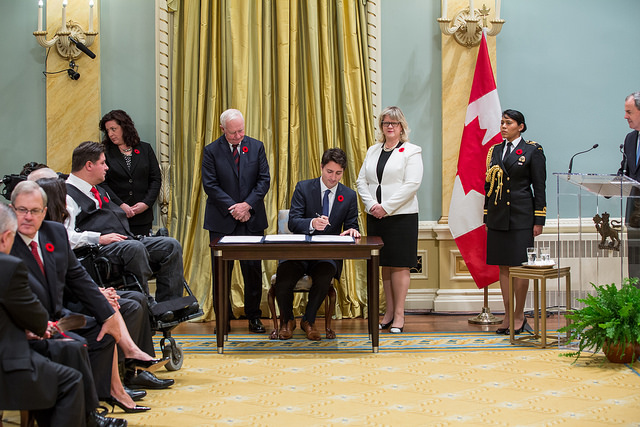Like this article? rabble is reader-supported journalism. Chip in to keep stories like these coming.
The most important public health, climate, and income inequality choice of this generation will be made in the next 12 or so months — our new voting system.
Prime Minister Trudeau has promised that 2015 was the last First Past the Post system and encouraging remarks in the House have been made about a consultative process to include voters and electoral reform experts. But why should we care? For most of us consumed with trying to make ends meet, getting the kids to school and wondering how Canada can possibly meet its COP 21 commitments while building new pipelines, voting reform seems pretty abstract.
But the evidence is impressive: the more closely political power is related to percentage of vote, the more the country’s policies tend to reflect progressive Canadian values and evidence based policy.
Painstakingly controlling for every conceivable factor, including religious affiliation, level of economic development, length of time as a democracy, baseline attitudes about the particular issue and changes over time globally, multiple academics and researchers have convincingly demonstrated that countries with proportional representation (PR) electoral systems are gentler places to live and better places to do business.
Countries that count votes, not seats, tend to enact policies that are less homophobic and less racist. They have lower incarceration rates and are less interested in “law and order” approaches to crime. They wage war less often and get out of wars in which they do engage faster.
They spy on their citizens less. They protect the environment better, embrace renewable energy faster and have more success reducing CO2 emissions. Forbes recently gave all five top spots for “Best places to do business 2015” to PR countries that have less income inequality, higher levels of tax-revenues-to-GDP and smaller rates of government debt. They have better health care and even lower rates of obesity.
What explains these startling findings? The Prime Minister has pointed out that there is strength in diversity. We have known that the absence of dissent and diversity in small groups stifles innovation. We now know it detracts from good policy making.
Having women on corporate boards strengthens the company. Proportional countries tend to elect more women; these parliaments tend to make decisions that strengthen the country. For example, well-governed countries will seek to reduce income inequality since it stalls growth.
Second, diversity increases issues under debate in the press. Voters become better informed. Think of the increase in the public discourse around climate change associated with Elizabeth May’s election.
Third, better-informed voters have a greater belief in their own agency and are more likely to hold politicians accountable. Politicians are less likely to clamp down on “little guys” and go easy on the rich. This is the essence of the “Make Every Vote Count” argument.
Winner-take-all systems like First Past the Post in Canada, pure preferential ballot in Australia and presidential voting in France dampen and silence diversity. PR institutionalizes it.
It is axiomatic that diversified power is harder to corrupt. As a result, PR countries are better at containing elites seeking to capture decision-makers. The evidence supports the removal of advertising of soft drinks aimed at children but the sugar lobby in Canada remains unrestrained and obesity continues to rise. Science has supported our shift to a green economy for decades but governments were captured by fossil fuel interests. PR countries with more diversified power tend to be more resistant to elites.
To be sure, the evidence is correlative rather than causal. But it is remarkably strong. Representation by women seems stuck at 27 per cent or lower in winner-take-all systems and is much higher in PR countries. Income inequality is rising in Canada, the U.S. and Britain much faster than in Germany or Scotland or Norway.
Canada has some of the diversity advantages of PR with multiple parties represented in the House already. But Bob Rae has noted that if we are simply to have preferential ballot added to our existing system we will be down to only two parties.
Opponents of PR sometimes caution against “extreme diversity” noting the outlier cases of Israel and Italy. With PR one can insulate against small parties simply by setting an appropriate bar for achieving a seat. All of the 10 expert panels in Canada have recommended proportional systems and all have proposed a bar of about four per cent.
A supermajority of Canadians voted for parties that promised to “Make Every Vote Count”. Turns out we may have voted for help in protecting more of our interests than just fairness in voting. If the Liberals choose proportional representation they will also strengthen our hand against the rising tide of obesity.
Patricia Lane is a lawyer in B.C. She is on the Boards of Canadians for Tax Fairness, Sierra Club B.C. and the BC Sustainable Energy Association. She is a member of Fair Vote Canada’s National Advisory Council.
Like this article? rabble is reader-supported journalism. Chip in to keep stories like these coming.
Image: Flickr/pmwebphotos



